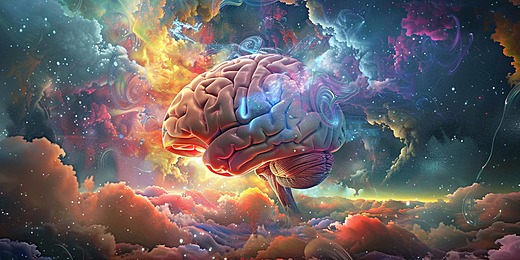The question of whether the mind can exist without the body has captivated thinkers across history, from philosophers like Descartes to modern neuroscientists. This debate touches on deep questions about the nature of consciousness, the mind-body connection, and the mysteries of human experience. Are our minds and bodies two separate entities, or are they so deeply intertwined that one cannot exist without the other? Let’s dive into the fascinating perspectives on this topic and explore where science and philosophy meet.
The Philosophy of Dualism: The Mind-Body Split
Dualism, a philosophical stance dating back to Plato and refined by René Descartes, argues that the mind and body are distinct. Descartes famously said, “I think, therefore I am,” suggesting that the ability to think and be aware is the essence of our existence—something separate from the physical body.
For dualists, the mind (or soul) is seen as an immaterial entity that could, theoretically, exist independently of the body. Some argue that even after the death of the body, consciousness might survive, as suggested by various spiritual and religious beliefs. This view often leads to:
- Religious and Spiritual Interpretations: Many religious traditions view the soul as an eternal part of the self, capable of existing beyond physical life. In this view, the soul or consciousness transcends the physical body, entering realms of afterlife or reincarnation.
- Near-Death Experiences (NDEs): Many who have had NDEs report sensations of leaving the body, observing events from outside their physical form, and even meeting spiritual beings. These accounts fuel the idea that consciousness could exist independently of the body.
Yet, dualism faces scientific challenges. The mind and body constantly interact through complex biological processes. From this perspective, our consciousness appears deeply rooted in the brain’s physical structures.
The Neuroscientific Perspective: Mind as a Product of the Brain
From a scientific and neuroscientific standpoint, the mind is inseparable from the physical brain. Consciousness, emotions, memories, and thoughts are all seen as the result of complex neural interactions within the brain.
Neuroscientists argue that:
- Consciousness Emerges from the Brain: In this view, consciousness is not an entity separate from the body. Rather, it is a product of intricate processes within the brain’s neural networks. Without these processes, the mind would not exist.
- Damage to the Brain Affects Consciousness: Neurological studies have shown that damage to certain areas of the brain can impact memory, behavior, and personality, suggesting that the mind relies on the physical state of the brain. For instance, conditions like Alzheimer’s disease or traumatic brain injuries drastically alter consciousness and cognition.
- Studies on Brain Activity: Neuroscience has mapped specific areas of the brain associated with different aspects of consciousness, such as the prefrontal cortex for decision-making and the limbic system for emotions. As technology advances, scientists are increasingly able to pinpoint brain regions and networks involved in complex cognitive functions.

The Debate Between Dualism and Physicalism
Today, most scientists support a physicalist approach, arguing that the mind cannot exist without the body. However, the debate between dualism and physicalism persists. Dualists argue that consciousness cannot be entirely explained by physical processes, pointing to the “hard problem” of consciousness: Why do subjective experiences feel a certain way?
On the other hand, physicalists argue that every mental experience or sense of self can be traced to neural mechanisms. For example, when we feel happy or sad, specific neural pathways activate, and these physical processes define our experiences.
Emerging Theories on Mind-Body Connection
While dualism and physicalism offer opposing views, there are other emerging theories that attempt to bridge the gap:
- Panpsychism: This theory suggests that consciousness is a fundamental part of the universe, present in all matter, not just in living beings. According to panpsychism, the building blocks of reality possess some form of awareness, which contributes to our individual consciousness.
- Quantum Consciousness: Some researchers suggest that consciousness could be rooted in quantum processes within brain cells. This theory, proposed by physicist Roger Penrose and anesthesiologist Stuart Hameroff, argues that the brain’s microtubules may operate at a quantum level, potentially allowing consciousness to exist independently of the physical body in some form.
- Embodied Cognition: This approach posits that our body plays a crucial role in shaping our mind and consciousness. Our interactions with the world through our bodies fundamentally shape our thoughts, emotions, and identity, suggesting that mind and body are inseparable.
These theories remain controversial but offer fresh perspectives on the age-old debate of whether the mind can exist independently of the body.

Practical Implications: How Our Understanding of Mind and Body Impacts Daily Life
Whether or not the mind can exist without the body may seem like an abstract question, but it has real implications for our daily lives, mental health, and personal growth.
- Mind-Body Practices: Techniques like mindfulness, meditation, and yoga emphasize the connection between mind and body, helping individuals cultivate a balanced relationship between physical and mental well-being.
- Mental Health Treatment: Understanding the mind as a product of the brain has led to effective treatments for mental health conditions. Approaches like Cognitive Behavioral Therapy (CBT) and medication address mental health from a physicalist perspective, using evidence-based methods to improve emotional well-being.
- Holistic Health Approaches: Many wellness practices combine physical and mental health, such as acupuncture, breathwork, and body-focused therapies. These methods, recognizing the mind-body connection, are popular for enhancing overall wellness and supporting mental health.
- Wearable Technology: Innovations like brainwave-monitoring headbands and neurofeedback devices are designed to help individuals understand and optimize the mind-body connection. These tools track mental and physical states, promoting a deeper awareness of how body and mind influence one another.
How to Strengthen the Mind-Body Connection
Even if the mind and body are separate, they influence one another immensely. Here are some practices to help you cultivate a strong mind-body connection:
- Practice Mindfulness Meditation: Meditation trains your mind to focus on the present, helping you to become more aware of your body’s sensations and your mental state. Regular practice can help bridge the mind-body gap.
- Engage in Physical Activity: Exercise is not only beneficial for your body but also has a significant impact on your mind. Physical activity releases endorphins, improving mood and enhancing mental clarity.
- Explore Creative Expression: Art, dance, and music can help you express your mind’s inner workings through physical movement, encouraging a harmonious relationship between mind and body.
- Try Journaling: Writing down your thoughts and emotions can bring your mental experiences into the physical realm, providing clarity and fostering self-awareness.
Conclusion: Are Mind and Body Truly Inseparable?
The question of whether the mind can exist without the body or if they are inseparable continues to intrigue us, as it touches on the essence of human existence. From dualism’s view of an independent soul to the scientific approach of consciousness as brain-based, perspectives on this topic remain diverse and thought-provoking.
Whether or not our minds can exist separately, what’s clear is that nurturing the mind-body connection can lead to a healthier, more fulfilling life. As we continue to explore the mysteries of consciousness and the brain, perhaps we will one day discover an answer that bridges the gap between science and philosophy, shedding light on the true nature of mind and body.



